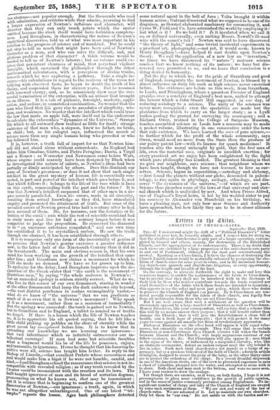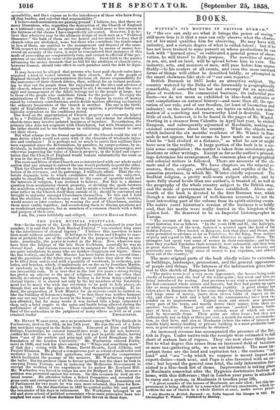fetus 1 t4t Clan
ABOLITION Or CHIJRCIi-ItATES.
September 21st, 1858. Sni—If I understand aright the drift of a "Political Dissenter's" letter published in your last, he honestly admits, and I respect him for doing so, that the abolition of church-rates is only part of a larger operation, contem- plated by himself and others, namely, the destruction of the Established Church, and the appropriation of its endownments. There is no doubt that such views are cherished by a large proportion of the anti-church-rate party in and out of Parliament, although for the most part ostentatiously dis- avowed. Speaking as a Churchman I believe the chances of destroying the Church Establishment would be materially enhanced by postponing the abo- lition of church-rates for some years to come, and in the meantime foment- ing church-rate quarrels and church-rate litigation, at every opportunity, through the length and breadth of the land. On the contrary, to abrogate forthwith the right to make and levy this vexatious impost, to confide the maintenance of the fabric to Churchmen, but to provide that they shall not be interfered with in the discharge of their task by those who neither contribute towards the funds required nor avail themselves of the fabric which those funds are intended to maintain; this appears to me the safest and most just policy, which those who desire to preserve the Church of England can pursue. By it Churchmen are ren- dered morally responsible for the fabric of their church, and legally free from all molestation from those -who are not Churchmen.
But I am well aware that such a settlement of the question will be strenuously opposed by a large number of Dissenters as well as Churchmen. Honest Dissenters, like your correspondent, will exclaim that a scheme like this will by no means answer their purpose; that it will benefit rather than damage the Church; that it will give the Establishment a clean bill of health, and a fresh lease of prosperity ; that it will protect it for many years to come against all assaults but those of revolutionary aggression. Dishonest Dissenters on the other hand will oppose it with equal vehe- mence but ostensibly on other grounds. They will argue that to exclude Dissenters or non-Churchmen from Church vestries will wider, the breach between Dissent and the Church ; will imply ungenerous mistrust of our fellow-creatures, &c. &c. But Churchmen will also oppose it ; men blind to the signs of the times, or influenced by a misguided chivalry, who, ince an obstinate commander, defend an useless outpost until the city behind it lies in ashes. Such men treat church-rates not merely as a badge of su- premacy, but as a precious title-deed of the faith of Christ ; a fortieth article of religion, designed to secure the piety of the laity, as the other thirty-nine arc to protect the orthodoxy of the clergy. In a recent dreadful shipwreck in one of the American rivers, one of the crew in phrenzied eagerness to save a chest of valuables, plunged into the water, and attempted to swim with it to shore. Both chest and man sank to the bottom, and were no more seen. I leave your readers to draw the analogy. Yet though there are enemies, as it were, on both flanks, I hope Ail' not presumptuous to place some confidence in the growth of pubhc opinion, and in the sense of justice commonly prevalent among Englishmen. No in- significant number of clergy and laity of the Church of England are swayed by some such sentiments as these. "We are sick and weary of the law of church-rates. We are ashamed of it. Let us maintain our own churches. Only let them be 'our own.' Do not saddle us with the burden sato-
sponsibility, and then expose us to the interference of those who have flung off that burden, and rejected that responsibility." I believe such sentiments are gaining ground : I believe, too, that there are many Dissenters, who, regarding the destruction of the Church of England as a national—nay, as an European calamity, would more or less concur in the fairness of the claims I have imperfectly advocated. Moreover, I do be- lieve that whatever may be the ultimate design of such men as a "Political Dissenter," the bulk of them are too honest and too manly to deny that if church-rates are abolished, none but those who contribute the funds raiaed in lieu of them, are entitled to the management and disposal of the same. With respect to rebuilding or enlarging churches by means of money bor- rowed on security of the rates, it must be remembered that instances of this mode of proceeding are comparatively rare, and cannot be effected if the pro- prietors of one-third in value of the parish object. Good faith to the parties advancing the money demands that no bill for the abolition of church-rates, however framed, should take effect in such parishes until the debt be liqui- dated.
It may however be alleged that persons who have paid church-rates have acquired a kind of vested interest in their church. But if the people of England through their representatives disclaim all future responsibility for the sustenance of their church fabrics, then, without for an instant pretend- ing to shut out the people from the enjoyment of the rites and services of the church, whose doors are freely opened to all, I do contend that the over- sight and management of the fabric belongs not to the people at large, but to those of the people who contribute funds for the purpose. To enjoy the ministrations of the Church is one thing ; to dispose in vestry of money raised by voluntary contributions, and to decide matters affecting exclusively the ordinary frequenters of the church is another. The one is the birth- right of Englishmen ; the other is, in my opinion, a privilege fairly and logically dependent on the conditions stated. One word on the appropriation of Church property not obscurely hinted at by a "Political Dissenter." It may be that any scheme for abolishing church-rates may involve isolated instances of injustice. Nevertheless, the primary idea does not originate with Churchmen, but with Dissenters, and the latter should not be too fastidious in criticising plans formed to carry out their views.
But what scheme for the formal spoliation of the Church could the wit of man devise which would not carry with it the elements of wholesale injus- tice and confusion ? It is perhaps not to much to assert that millions have been expended since the Reformation, by parishes, by congregations, by in- dividuals, in building and endowing churches, in building parsonages, and otherwise improving the value of Church property, in the belief and expec- tation that the Church of England would remain substantially the same as it was in the days of Elizabeth. The roots and fibres of that Church are so intertwined with our whole social system that any attempt to subvert the one would probably imperil the other. That the Church needs reform in its internal economy, and in the distri- bution of its revenues, and its patronage, I willingly admit. That the ela- borate dogmatic tests to which candidates for ordination are subjected, might be simplified, without detriment to the cause of apostolic truth and the interests of religion, I am inclined to believe. But this is a distinct question from secularising church property, or dividing the spoils between the multiform religionists of the day, and to attain a beneficial issue, should arise rather in the Church itself than outside of it ; should be canvassed and brought to maturity amongst Churchmen themselves. To this end I hold that the abolition of church-rates and the institution of church vestries, would sooner or later conduce, by rousing the zeal of Churchmen, uniting them more visibly together, and accustoming them to discuss questions not as recalcitrant ratepayers, but as members of a common church with a faith and purpose of their own.
I am, Sir, yours faithfully and obliged, ARTHUR HALLAM ELTON.



























 Previous page
Previous page